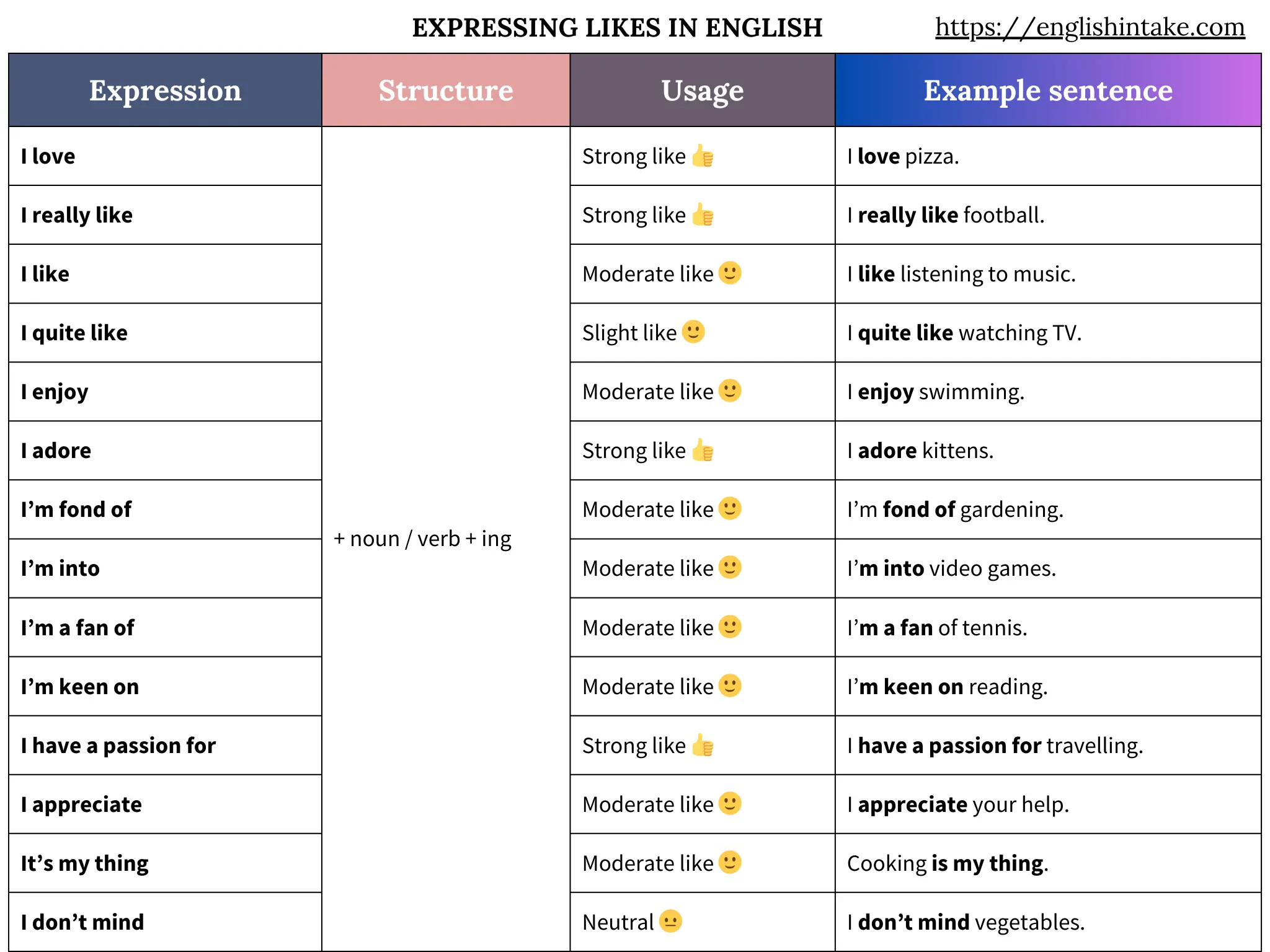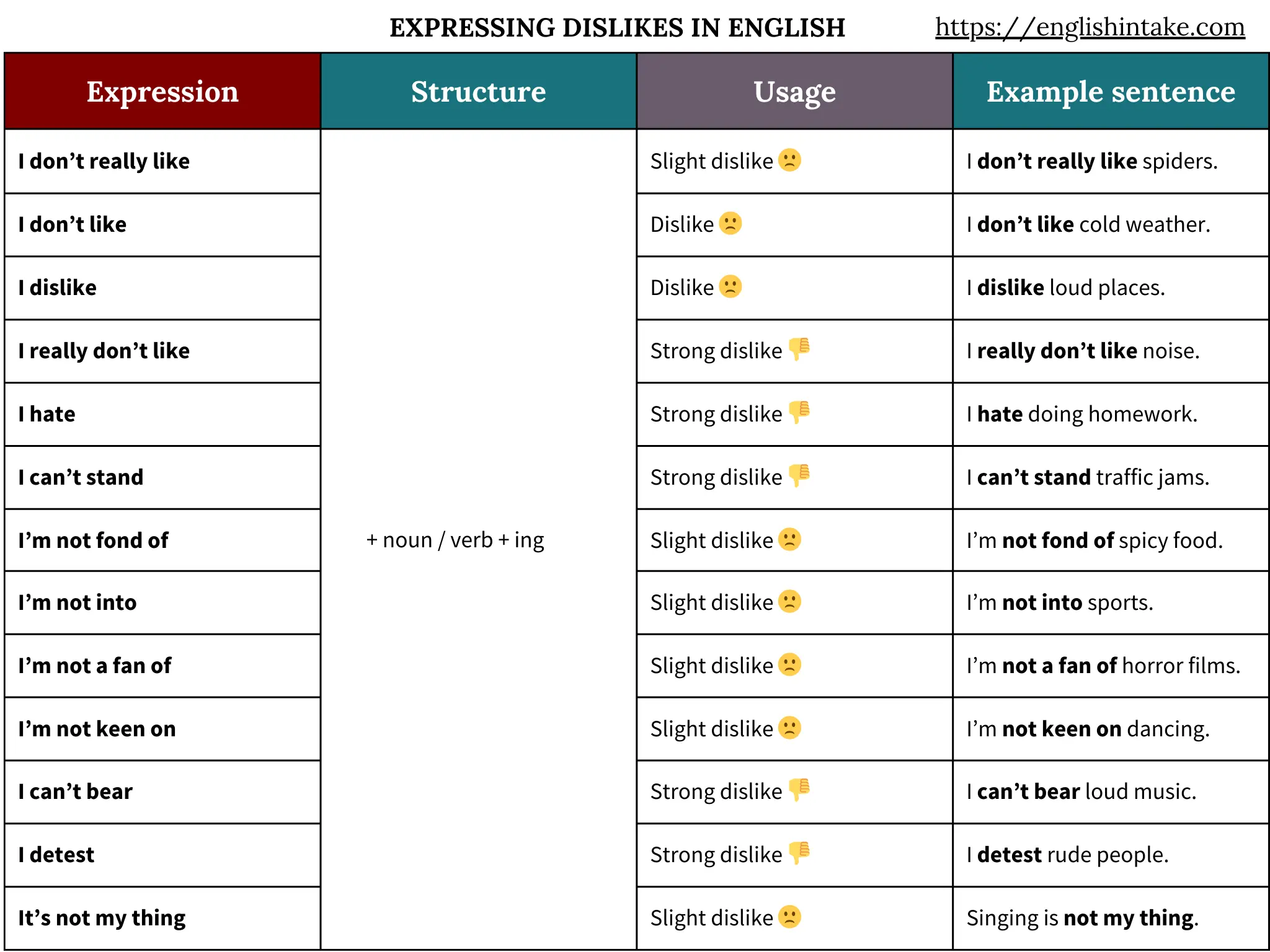1. Common phrases used by native speakers to express likes and dislikes
Expressing your likes and dislikes allow people to get to know you better. You can use the following phrases to talk about the things you like and do not like.
Expressing likes
- I like + [noun/gerund]
- I love + [noun/gerund]
- I enjoy + [noun/gerund]
- I adore + [noun/gerund]
- I’m fond of + [noun/gerund]
- I’m into + [noun/gerund]
- I’m a fan of + [noun/gerund]
- I’m keen on + [noun/gerund]
- I have a passion for + [noun/gerund]
- I appreciate + [noun/gerund]
- It’s my thing
Expressing likes in sentences:
I like chocolate.
I like swimming.
I love pizza.
I love dancing.
I enjoy reading.
I adore animals.
I adore playing the guitar.
I’m fond of classical music.
I’m fond of painting.
I’m into photography.
I’m a fan of soccer.
I’m a fan of boxing.
I’m keen on travelling.
I have a passion for fashion.
I have a passion for learning new languages.
I appreciate thoughtful conversations.
Swimming is my thing.

Expressing dislikes
- I don’t like + [noun/gerund]
- I dislike + [noun/gerund]
- I hate + [noun/gerund]
- I can’t stand + [noun/gerund]
- I’m not fond of + [noun/gerund]
- I’m not into + [noun/gerund]
- I’m not a fan of + [noun/gerund]
- I’m not keen on + [noun/gerund]
- I can’t bear + [noun/gerund]
- I detest + [noun/gerund]
- It’s not my thing.

Examples
I don’t like spiders.
I don’t like running.
I dislike crowded places.
I dislike waiting in lines.
I hate traffic.
I hate being late.
I can’t stand loud music.
I can’t stand rude people.
I’m not fond of horror movies.
I’m not into reality TV shows.
I’m not into dancing.
I’m not a fan of spicy food.
I’m not keen on swimming.
I can’t bear dishonesty.
I detest injustice.
I detest waking up early.
Playing the guitar is not my thing

2. Expressing preferences
Common expressions
- I prefer + [noun/gerund] + to + [noun/gerund]
- I’d rather + [verb] + than + [verb]
- I’d sooner + [verb] + than + [verb]
- I favour + [noun/gerund] + over + [noun/gerund]
- I have a preference for + [noun/gerund]
- I’m more inclined to + [verb/gerund]
- I tend to lean toward(s) + [noun/gerund]
- I find + [noun/gerund] + more appealing than + [noun/gerund]

Examples
I prefer tea to coffee.
I prefer walking to driving.
I’d rather read than watch TV.
I’d rather cook at home than eat out.
I’d sooner go to the beach than go shopping.
I’d sooner listen to music than watch a movie.
I favour winter over summer.
I favour painting over drawing.
I have a preference for classical music.
I have a preference for Italian cuisine.
I’m more inclined to exercise in the morning.
I’m more inclined to watch documentaries.
I tend to lean towards staying home on weekends.
I tend to lean towards science fiction novels.
I find comedy movies more appealing than horror films.
I find biking more appealing than running.
2. Idiomatic expressions
Have a soft spot for sb/sthg to like something or someone very much. “I have a soft spot for old black-and-white movies.” “I have a soft spot for her.”
Have a thing for sb/sthg to express a strong liking or preference for something or someone. I have a thing for classic rock music; it’s my go-to genre.
Float one’s boat to be what someone likes. If hiking in the mountains floats your boat, then you should definitely go for it.
Can’t get enough of to express a strong preference or enjoyment of something, often to the point of wanting more. I can’t get enough of this chocolate cake; it’s the best I’ve ever had.
Be head and shoulders above to express that something/someone is significantly better than the others. My favourite actress is Michelle Yeoh. Her performance is head and shoulders above the rest.
Take a shine to to develop a liking or preference for someone or something. I’ve taken a shine to yoga recently; it’s become my preferred form of exercise.
3. Being neutral
Sometimes, you don’t feel strongly about something. Imagine you were given a choice of ice cream flavours: chocolate and vanilla. If you love chocolate and don’t like vanilla, your choice is easy. In this case, you can simply say: I prefer chocolate. But what if you like both flavours? You don’t have a strong favourite. In this case or in a similar situation, you can say:
- “I don’t mind.” This means you’re okay with either option.
- “I’m neutral.” This means you’re in the middle. You don’t have a strong feeling one way or the other.
- “It’s all the same to me.” This means both choices are equally good or equally bad in your eyes.
Study the example conversations below.
Anna: Would you like to watch a comedy or a drama movie tonight?
Bob: I don’t mind. Both sound good to me.
Anna: Okay, let’s watch a comedy then!
Alice: What do you think about increasing the tax rates for the wealthy?
Bob: I’m pretty neutral on that topic. My main concern is a good policy to decrease the unemployment rate in the country.
Alice: I agree with you. That should be our top priority.

